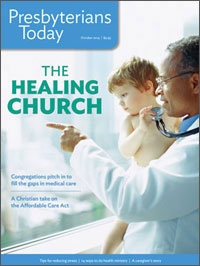 The church as health clinic
The church as health clinic
Congregations pitch in to help fill the gaps in medical care.
by Cary Estes
She was the type of person who often slips through the cracks of society: no insurance, more than $10,000 in medical bills, and blood pressure that had soared into stroke range. She could not afford to be treated, but without treatment she could not continue working as a housekeeper—which meant that she wouldn’t be able to earn the money to pay for treatment.
The woman desperately needed a helping hand in order to find a healing hand. And she managed to receive that assistance from Lois Bazhaw, a nurse who belongs to Faith Presbyterian Church in Greensboro, North Carolina. The woman had come to Faith Presbyterian for the church’s food pantry, and while there explained her situation to Bazhaw.
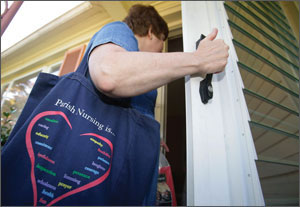
Volunteer faith community nurse Joanie Friend of Bradley Hills Presbyterian Church arrives to care for an elderly patient at her home in Bethesda, Maryland. Faith community nursing has grown recently, with approximately 15,000 nurses trying to plug some of the healthcare gaps in a nation where, as of 2012, 48 million people lack insurance (a number that began to drop with the Affordable Care Act).
Alarmed at the woman’s blood-pressure reading—“I was afraid she was about to die,” Bazhaw recalls—Bazhaw made a few calls and managed to have her admitted to a nearby teaching hospital that had a free student-run internal medicine clinic. The woman received the immediate treatment she needed there, and through follow-ups her health slowly improved.
“I really feel like that’s the sort of thing we’re supposed to be doing,” Bazhaw says. “We’re God’s vessels. We’re his hands and feet. We’re supposed to take care of each other. I think it is important for any church to include physical health as part of the wholeness factor, along with spiritual and emotional [health]. It’s like a three-legged stool. If one of those legs is out of kilter, you fall. You need support from all three.”
In response to society’s growing need for healthcare, a number of Presbyterian congregations have, with the help of the Presbyterian Health Network, added a physical component to the spiritual and emotional aspects of church ministry. These healthcare ministries range from simple health screenings and exercise classes to free clinics and even assistance in end-of-life circumstances.
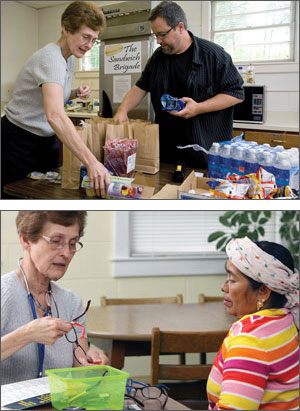
Top: Faith community nurse Lois Bazhaw and a member of Faith Presbyterian Church pack bags of food for the homeless who “hang out” on the street corners of Greensboro, North Carolina. | Bottom: Bazhaw helps a refugee in Greensboro get reading glasses.
But in all cases the goal is the same: to fill the gaps in healthcare coverage and to minister to both body and soul.
“There’s such a need for this,” says Joanie Friend, a registered nurse who attends Bradley Hills Presbyterian Church in Bethesda, Maryland. “There are people who don’t have anybody looking out for them. And doctors now are so constrained with the time they have to give to patients. So it is important for people to have somebody who can help them really understand what is going on with their health.”
Part of the need stems from the escalating cost of healthcare and the issues that affect the availability and affordability of insurance. This has led to the need for additional healthcare options beyond traditional physicians and hospitals, according to Dan Hale, assistant professor of medicine at Johns Hopkins University.
“We’re looking at a real strain on the finances of healthcare,” says Hale, a member of Brown Memorial Park Avenue Presbyterian Church in Baltimore. “Preventive care has always been the right thing to do, but now there are some financial incentives to engage in it, especially in illness management. So how can you help people stay healthy and remain in their homes rather than having to go to hospitals?
“You’re hearing from organizations like the American Hospital Association that we have to pivot toward the community and develop partnerships. And often the best way to reach people is through faith communities.”
Multifaceted ministries
One faith community that has responded to the call is Second Presbyterian Church of Indianapolis, Indiana. Its ministries include Care Corps, a volunteer program that supplements ministerial care. Care Corps volunteers make phone calls and visit those in need, engaging in nurturing and confidential conversations, and even deliver meals and provide other individualized help. Second Presbyterian also offers professional counseling through its CenterPoint Counseling services.
(See sidebar, below)
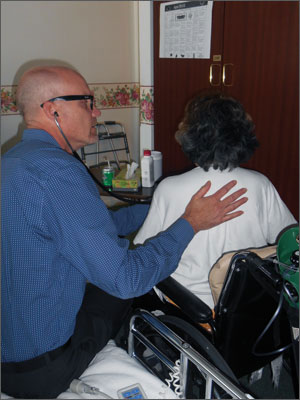
Presbyterian physician Jim Wright examines a patient. With an MA in theological studies from Union Presbyterian Seminary and a certificate in bioethics, Wright brings a unique perspective to the practice of medicine and has chosen to focus on seniors, practicing only under federally funded Medicare.
Nearly 1,000 miles away, in Daytona Beach Shores, Florida, Westminster By-the-Sea Presbyterian Church decided to launch a healthcare ministry when two members in their 30s died of melanoma, a type of skin cancer. The ministry, called Body, Mind, and Soul, offers skin screenings and other preventive services, including vaccinations and blood-pressure checks.
One of the first people to benefit from the ministry was none other than the church’s senior pastor, Jeffrey Sumner. He was shocked to learn during a cholesterol screening that he had a reading of 341—about 100 points above the level considered high—and was in danger of developing diabetes despite not being overweight.
“This is a program that can help save lives, and I’m an example of that,” Sumner says. “I tell people my health story and why I think it’s so important to do this. It’s become something of my second gospel.”
The program includes regular health seminars on a wide variety of topics, from head (“Brain Attack: The New Medical Emergency”) to toe (“Feet Are the Sole of the Body”). And Sumner says the cost of the ministry to the church is nominal, since both the healthcare coordinators and the speakers all offer their services for free.
“We have more than 700 people in our congregation, and some of them don’t always take care of their health very well,” Sumner says. “But . . . I’ve built a trust level with these people, which is one of the reasons why I think the health ministry has taken hold.”
Healthcare ministries like those offered by Westminster and other Presbyterian congregations can provide an acceptable alternative for people who are reluctant to go to doctors and hospitals, even when they are seriously ill.
“Some people [refuse] the healthcare system because they don’t trust it,” Hale says. “But when you reach them through an organization that they trust already and are a part of—like the church—they’re more willing to listen. There is the trust factor, and also the comfort and convenience. It’s nice to be able to walk out of a service and go over to the fellowship hall and have a nurse or somebody else who is trained take your blood pressure. It’s convenient, it’s comfortable, and it feels much better than going to a sterile, ‘foreign’ health facility.”
Faith community nursing
Many healthcare ministries rely on voluntary help from registered nurses.
The American Nurses Association recognizes faith community nursing as a specialty practice in which registered nurses work with congregational leaders to provide healthcare support for both parishioners and community members. The services consist of medical screenings and assistance with navigating the maze of healthcare options and financial resources.
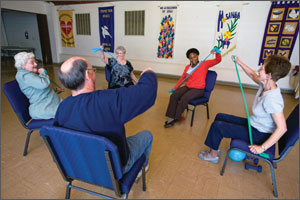
Faith community nurse Lois Bazhaw, right, leads a seated exercise group for congregation members and others who require or simply desire alternative forms of exercise.
“It is ‘no gloves’ nursing,” says Ruth Syre, a member of Rustburg Presbyterian Church in Virginia, referring to the latex gloves nurses wear when performing regular physical examinations. “We’re not changing dressings or doing injections. Instead, we empower folks to take care of their health and get the resources they need.
“We’re with them on whatever step of the journey they’re on. For me, it’s all about stewardship of the gift of life, and to help people take the best possible care they can of this life we’re given. We have to take care of ourselves so we can take care of others.”
Pat Welsh, a faith community nurse who attends Anchorage Presbyterian Church near Louisville agrees. She says the nurses are available to offer assistance “from womb to tomb” and to help people make the best possible healthcare choices.
Centerpoint: Centered on counseling
Second Presbyterian Church in Indianapolis began CenterPoint Counseling in 1987 as a separate ministry of the church and began hiring staff then. It now has a staff of 12, including eight contract employees—licensed mental health counselors, licensed clinical social workers, and marriage and family therapists. Its executive director, David Chaddock, is an ordained Presbyterian Church (U.S.A.) minister. Last year CenterPoint served more than 1,000 clients. Its main source of income is clients, including insurance, but its Samaritan Fund provides financial help for low-income clients. The Samaritan Fund is funded by donations from congregation members and the community. CenterPoint’s services include a New Day program for children of divorce, from preschool through eighth grade. Jennifer Murphy, CenterPoint’s office coordinator, says the decade-old program teaches children of divorce effective ways to deal with their emotions. “Kids tell us, ‘New Day is a place where I could be heard and talk about things I wanted to talk about without worrying about hurting my parents’ feelings,’ ” she says.
“What I love about it is we are there for the long run,” Welsh says. “We’re with them before they go to the hospital, and we’re still there after all the other agencies are gone. So there’s this huge trust that they have allowed us to walk with them during a time of transition in their life. It’s holy ground that we’re invited into.”
Joanie Friend, of Bradley Hills Presbyterian Church in Bethesda, also is a faith community nurse. One day she received a call asking if she could take meals to an elderly member of the church who was ill and had no family. A friend of the woman and another church member had been providing the meals but were both unavailable that day, so they turned to Friend. Upon arriving, Friend realized that the situation was serious, and she persuaded the woman to let her take her to a doctor.
The woman had developed a large, bulging area of infection from a previous surgery, and she had to have part of her pelvis removed. For the next month, she remained in a rehabilitation facility, but Friend visited regularly and brought the woman her mail. Friend continued to visit after the woman returned home. When the woman eventually died, Friend participated in her memorial service.
“I continued to provide her with care through the end of her life,” Friend says. “To me, this is what is meant by ‘being my brother’s keeper.’ Jesus is the guide for my behavior as I try to help people heal in body, mind, and spirit. The thing that sustains me is knowing what a difference I can make in people’s lives.”
And for those who are involved in healthcare ministries, making a difference is the best possible medicine.
Cary Estes is a freelance writer based in Birmingham, Alabama.
Presbyterian Health Network
The healthcare ministries in this article are not isolated programs. They are each supported and sometimes even made possible by the Presbyterian Health Network (PHN), a web of relationships, resources, professional counsel, and nursing. As a network of the Presbyterian Health, Education, and Welfare Association, PHN assists congregations looking to kick-start a ministry, plan a worship service for wholeness and healing, or connect with healthcare professionals. To get involved, make contact, donate, or explore their free resources: pcusa.org/phewa


